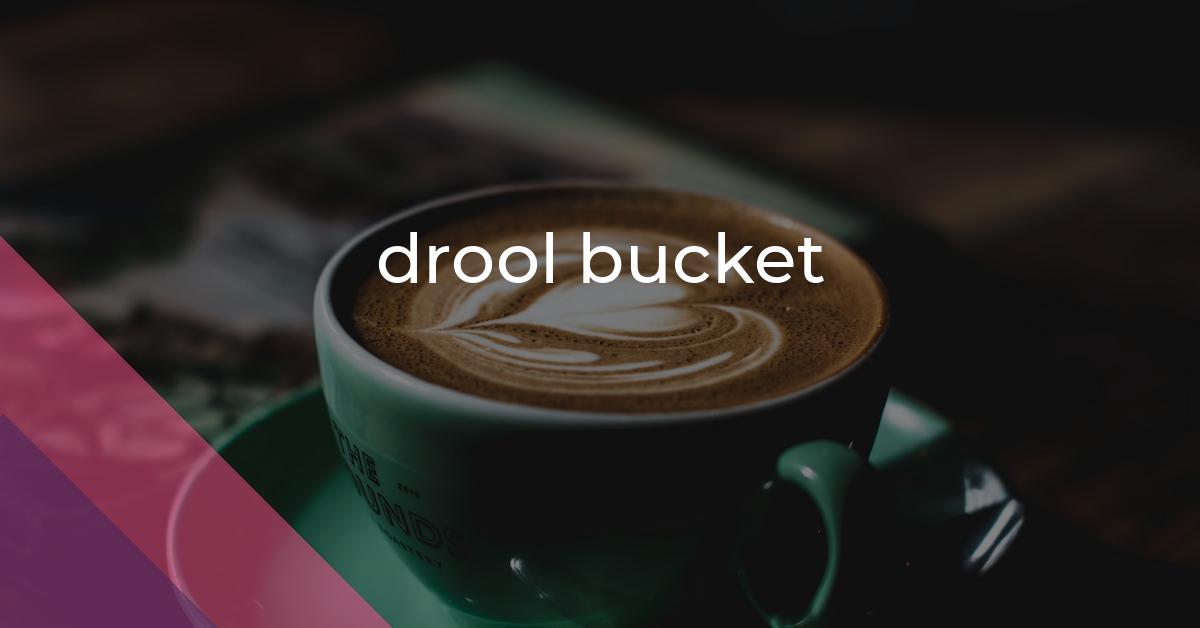drool bucket: Idiom Meaning and Origin
What does ‘drool bucket’ mean?
The idiom drool bucket refers to a person or thing that is exceptionally appealing or desirable, often to the point of causing excessive enthusiasm or admiration.

Idiom Explorer
The idiom "lay eyes on" means to see or look at something. It implies that the person looking at something has a strong desire or interest in it.
An idiom used to describe someone who is in an emotional or mental state of extreme agitation, distress, or confusion.
The idiom "hot stuff" is used to describe someone or something that is outstanding, remarkable, or highly skilled.
The idiom "hot shit" refers to someone or something that is highly impressive, successful or influential. It is used to convey a sense of superiority or remarkable qualities.
The idiom "hoover up" means to consume or gather something quickly and thoroughly. It is often used to describe someone who eats or drinks a large amount of food or a person who collects or acquires something in a rapid and efficient manner.
The idiom "have eyes bigger than one's stomach" means to take or desire more than one can actually consume or handle.
The idiom "gagging for it" means to have a strong desire or craving for something, often of a sexual nature.
The idiom "dollar-sign eyes" refers to someone who is extremely greedy or obsessed with money, often to the point of disregarding ethical or moral considerations.
The idiom "diarrhea of the mouth" refers to someone who talks excessively and often without thinking, spouting out words uncontrollably and without any filter.
Curiosity Spurred: Unraveling Drool Bucket
The idiom "drool bucket" is a commonly used phrase in American English that refers to a receptacle used to collect saliva or drool. This idiom is often used figuratively to describe someone who is highly enthusiastic or excessively excited about something. The exact origin of this idiom is unknown, but its usage and meaning have become ingrained in the vernacular of many English speakers, and it has taken on various interpretations in different contexts.
One interpretation of the idiom "drool bucket" is that it conveys a sense of intense excitement or anticipation. The phrase evokes the image of an overflowing container, like a bucket filled to the brim with drool, capturing the essence of enthusiasm. This interpretation suggests that the person in question is so enthralled by a particular subject or situation that their level of excitement is comparable to that of an overflowing bucket.
Another possible interpretation of the idiom is that it conveys a sense of excessive desire or longing. When someone is described as a "drool bucket," it implies that they have an insatiable appetite for something, whether it be food, success, or any other desired object or outcome. The metaphorical association with drooling suggests a strong craving or longing that cannot be easily satisfied.
It is worth mentioning that the idiom can also have negative connotations. In certain contexts, it can be used to mock or belittle someone for their perceived overzealousness or lack of control over their emotions. By characterizing someone as a "drool bucket," it implies that their level of excitement or enthusiasm is excessive to the point of being irrational or childish.
Despite the lack of concrete historical evidence, the idiom "drool bucket" is widely used and recognized in American English. It can be heard in various everyday or informal settings, indicating its acceptance as a part of contemporary idiomatic expression. The power and impact of idiomatic language lie in its ability to offer succinct and often vivid imagery, allowing individuals to convey complex ideas or emotions in a concise and memorable manner.
One related idiom is "bucket of rust," which is used to describe something that is in a very poor condition or no longer functional. While this idiom may seem unrelated to "drool bucket" at first glance, both idioms use the word "bucket" to metaphorically represent an overflowing or excessive state. In "drool bucket," the overflow represents excitement or desire, while in "bucket of rust," it represents decay or disrepair.
Another related idiom is "bucket down," which means to rain heavily. Although this idiom does not directly connect to "drool bucket," it shares the use of the word "bucket" to represent a large quantity or intensity. In "bucket down," the word "bucket" represents the heavy rainfall, while in "drool bucket," it represents the overflowing excitement or desire.
A third related idiom is "drop in the bucket," which means something that is small or insignificant in relation to a larger whole. This idiom also uses the word "bucket," but in a different context. While "drool bucket" and "drop in the bucket" do not have explicit connections in meaning, the shared use of the word "bucket" adds to the richness and variety of idiomatic expressions in the English language.
While the exact origins of the idiom "drool bucket" may remain a mystery, its continued usage and interpretation highlight the adaptability and evolution of idioms within a language. The phrase has become firmly ingrained in the lexicon of English speakers, serving as a testament to the richness and creativity of idiomatic expressions in conveying the depth and complexity of human experiences.
Example usage
Examples of how the idiom *drool bucket* can be used in a sentence include:
1. He couldn't help but stare at the lavish buffet spread, his mouth watering as he reached for the drool bucket.
2. The sight of his favorite dessert, a decadent chocolate cake, was enough to make him grab a nearby drool bucket.
3. As he watched the cooking show on television, the chef's mouthwatering dishes made him wish he had a drool bucket handy.
More "Colloquial" idioms



